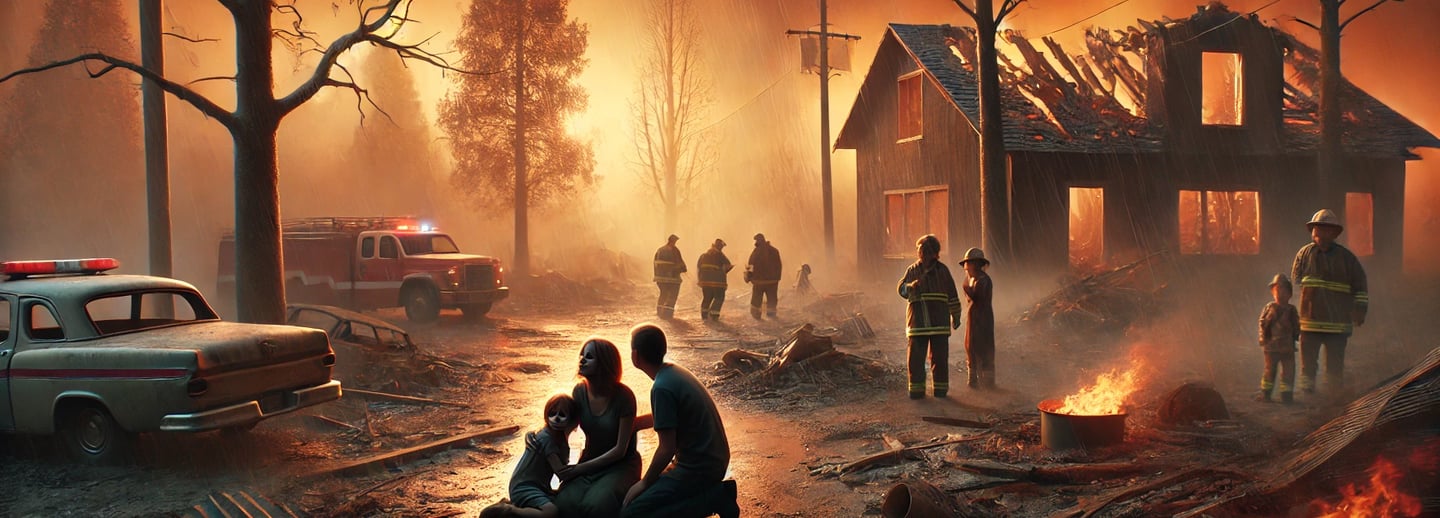Mental Health Impacts of LA Wildfires: Coping and Resources
Explore the Impacts of LA Wildfires on mental health with expert insights, coping strategies, and local resources to aid recovery. Learn when and how to seek help.
1/14/20253 min read


The recent wildfires that swept through Los Angeles have left a trail of devastation, with damage estimates ranging between $135 billion and $150 billion, making them potentially the most expensive natural disaster in U.S. history (Investopedia, 2025). However, the destruction extends beyond physical infrastructure. The psychological and emotional toll on residents is equally significant, rooted in the interplay of neurobiological, environmental, and psychosocial factors. Gaining insight into these aspects is essential to creating effective recovery interventions.
Neurobiological Changes Induced by Trauma
Experiencing a traumatic event, such as a wildfire, can have profound effects on brain function and stress responses:
Triggered Stress Response: When faced with imminent danger, the body releases stress hormones like cortisol and adrenaline. While this reaction is crucial for survival in the short term, long-term activation can lead to cognitive impairments and emotional instability.
Alterations in Brain Functioning: Prolonged stress can disrupt key brain regions, such as the amygdala and prefrontal cortex, which regulate emotions and decision-making. These changes increase susceptibility to conditions like PTSD and depression (Dashnaw, 2025).
Environmental Consequences on Mental Health
The physical aftermath of wildfires creates conditions that intensify mental health struggles:
Displacement and Isolation: Losing one's home often results in displacement, severing social ties critical for emotional support. The lack of stability compounds the feelings of uncertainty and anxiety.
Limited Access to Resources: The destruction of infrastructure reduces access to essential services, including healthcare, further exacerbating mental health challenges.
The Social and Emotional Ripple Effect
Natural disasters leave behind collective emotional scars that can hinder recovery:
Community Grief and Trauma: Shared losses can strain communal bonds, leading to reduced social cohesion and heightened individual distress.
Financial Burden: Economic setbacks caused by property damage or job losses contribute significantly to stress, making it harder for individuals and families to recover emotionally (Barrons, 2025).
A Case Study of Impact
Imagine a family displaced by the wildfires, grappling with the dual burden of financial insecurity and emotional upheaval. Parents are tasked with finding shelter and rebuilding their lives while children face anxiety stemming from disrupted routines and schooling. This example highlights how intertwined environmental, neurobiological, and psychosocial factors contribute to mental health struggles after disasters.
Effective Coping Mechanisms
To address the emotional and psychological toll of such events, a holistic approach is required:
Professional Assistance: Seeking guidance from mental health professionals can provide strategies to navigate trauma and stress effectively.
Community Support: Joining support groups fosters a sense of solidarity and collective resilience, which are crucial for recovery (Jewish Federation Los Angeles, 2025).
Mindfulness Techniques: Activities such as meditation and deep breathing help manage stress by promoting relaxation and emotional control.
Physical Activity: Exercise releases endorphins that improve mood and reduce stress hormone levels.
Media Moderation: Limiting exposure to distressing news reduces the risk of re-traumatization and helps maintain emotional stability.
Knowing When to Seek Help
It’s critical to recognize when professional intervention is needed. Consider seeking help if you or someone you know experiences:
Persistent sadness or hopelessness
Flashbacks or intrusive thoughts about the disaster
Difficulty managing daily responsibilities
Social withdrawal
Increased reliance on substances as a coping mechanism
Conclusion
The psychological effects of disasters like the Los Angeles wildfires are complex and multifaceted, driven by a combination of neurobiological, environmental, and social factors. Addressing these challenges requires both individual and community-based efforts. If you are struggling, reaching out for help is a sign of resilience, not weakness. Numerous resources are available to support recovery and promote well-being. Remember, no one has to face these challenges alone.
If you’re struggling with mental illness as a result of the LA fires, reach out to us to discuss personalized treatment options. Our virtual care services are designed to make mental health support accessible and non-judgmental.
Signature Providers Nursing Corp. offers comprehensive online psychiatry services, including evaluations, prescription management, and continuous care, all designed to fit your unique lifestyle and preferences. With the guidance of our experienced psychiatric nurse practitioners, you can receive compassionate, high-quality care from the convenience and privacy of your home. This holiday season, let us be part of your support system, helping you stay resilient, balanced, and thriving during this festive time. Click here to schedule an appointment.
Mental Health Impacts of Los Angeles Wildfires: Coping Strategies and Resources.
© 2024 - 2026. Signature Providers Nursing Corp. | All rights reserved.
Disclaimer: Any treatment or medication information obtained from this website is solely for informational purposes. Consult your provider for any mental health related issues.
If you or your loved one has a psychiatric or mental health crisis, Please call 911 or the 988 Suicide & Crisis Lifeline.
Monday 0530 pm - 0800 pm
Tuesday 0530 pm - 0800 pm
Wednesday 0530 pm - 0800 pm
Thursday 0530 pm - 0800 pm
Friday Closed
Saturday 08:30 am-06:00 pm
Sunday 08:30 am-06:00 pm
1690 W Shaw Ave STE 220, Fresno CA 93711

